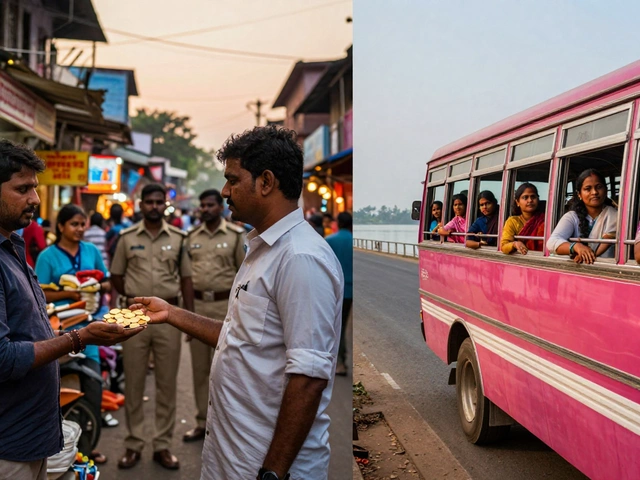Honeymoon Task Assignment Quiz
Answer these 4 questions to get personalized recommendations for who should handle each part of your honeymoon planning. Your responses help identify each partner's strengths and preferences.
Your Personalized Task Assignment Plan
When it comes to the honeymoon is the first trip a newly‑wed couple takes together, celebrating their marriage and setting the tone for years to come, the biggest question isn’t just where to go-it’s who actually makes the reservations.
Quick Takeaways
- Start the honeymoon booking process 6-9 months before the wedding to lock in the best rates.
- Divide tasks based on strengths: research vs. logistics, budget vs. preferences.
- Consider three main approaches: DIY online, travel‑agency assistance, or hiring a wedding planner.
- Use a shared checklist to keep both partners on the same page.
- Watch out for hidden fees, visa timing, and travel‑insurance gaps.
Why the Who‑Matters Question Exists
Traditionally, one partner (often the bride) handled the bulk of wedding logistics, while the other focused on outfits or speeches. Modern couples, however, tend to split duties based on skill set, available time, or even who enjoys planning more. Deciding who books the honeymoon early prevents friction later and ensures every detail aligns with both partners’ expectations.
Setting the Timeline
Booking too early can lock you into a price that later drops; booking too late can mean sold‑out resorts or sky‑high airfare. A reliable timeline looks like this:
- 6-9 months out: Pick destination, set budget, and discuss the style of trip (adventure, beach, city).
- 4-6 months out: Research flights, accommodations, and any required visas.
- 2-4 months out: Secure bookings, purchase travel insurance, and arrange airport transfers.
- 1 month out: Confirm all details, check passport validity, and pack.
Both partners should be present for the major milestones-especially the budget‑setting stage-to avoid surprise expenses.
Booking Options: DIY, Agency, or Planner?
Each method has its own flavor. Below is a side‑by‑side look so you can pick the one that fits your dynamic.
| Method | Cost | Customization | Time Investment | Support Level |
|---|---|---|---|---|
| DIY Online | Low (booking fees only) | High (you pick every detail) | High (research takes hours) | Self‑service (customer chat bots) |
| Travel Agency | Medium (service fee + markup) | Medium (agents suggest packages) | Low (agent handles logistics) | Personal advisor, 24/7 assistance |
| Wedding Planner | High (full‑service fee) | High (integrates with wedding theme) | Very Low (planner does everything) | End‑to‑end coordination, on‑site support |
To make the table meaningful, notice the three attributes that matter most to couples: total cost, how much you can tailor the experience, and how much of your own time you’re willing to spend.
Who Should Take Which Tasks?
Even if you pick a single method, the workload can be split. Below is a practical checklist that assigns responsibilities based on typical strengths.
- Research & Inspiration: The partner who loves scrolling Instagram, reading blogs, or watching travel vlogs should compile destination ideas.
- Budget Management: The more financially‑savvy partner tracks costs in a spreadsheet, checks credit‑card rewards, and negotiates with hotels.
- Flight Booking: If one of you is comfortable with the nuances of airline alliances, let them secure the tickets.
- Accommodation & Packages: The other partner can compare resort amenities, read reviews, and lock in the best room type.
- Documentation: Whoever has the passport already expiring should handle visa applications and travel‑insurance paperwork.
- Final Confirmation: A joint call 48hours before departure to double‑check timings, transfers, and any special requests.
When tasks align with personal interests, the process feels less like a chore and more like a shared adventure.
Money Matters: Budget, Rewards, and Splits
Most couples set a honeymoon budget early, but the source of that money can differ. Here are three common approaches:
- Joint Pool: Both contribute equal amounts into a shared account. Transparency is high, but it can strain cash flow if one partner’s income fluctuates.
- Reward‑Driven: The partner with the best travel‑reward credit card books flights to maximize points, then the other covers the remaining hotel cost. This works well if the reward card offers complimentary upgrades.
- Family Contributions: Some families gift a portion of the cost. In that case, keep the gift separate and track it against the overall budget to avoid overspending.
Whichever method you choose, a simple spreadsheet (Google Sheets or Excel) that lists: destination, flight cost, hotel cost, meals, activities, and contingency (usually 10% of total) keeps everything crystal clear.

Keeping Things Safe: Insurance, Passports, and Visas
Travel insurance is an often‑overlooked line item. A good policy covers trip cancellation, medical emergencies, and lost baggage. When you compare policies, check for these three attributes:
- Coverage limit for medical expenses (minimum US$100,000 is a safe benchmark).
- Cancellation clause - does it reimburse if a storm closes the resort?
- Adventure activities - does it include scuba, hiking, or zip‑lining if you plan those?
Passports should have at least six months’ validity beyond your return date. Visa processing times vary: some countries grant e‑visas within 48hours, while others require a two‑week in‑person appointment. Assign the partner with the more organized paperwork style to handle these deadlines.
Common Pitfalls and How to Dodge Them
- Double‑Booking: If you’re using both an agency and an online platform, double‑check that the same flight isn’t booked twice.
- Hidden Fees: Some resorts add resort fees, taxes, or airport‑transfer surcharges after you’ve paid. Ask for an all‑inclusive quote before you sign.
- Mismatch of Expectations: One partner may envision a quiet beach while the other dreams of nightly shows. A quick “must‑have vs. nice‑to‑have” list early on prevents later disappointment.
- Last‑Minute Packing: Forgetting a charger or travel adapter can ruin a honeymoon. Create a shared packing checklist three weeks before departure.
Next Steps: Your Action Plan
Ready to turn the discussion into a concrete plan? Follow these three steps this week:
- Schedule a 30‑minute “budget & dream” chat. Write down destination ideas and a rough cost range.
- Assign who will research flights and who will look at hotels. Set a deadline for each (e.g., Friday).
- Create a shared Google Sheet with columns for expense, payer, status, and notes. Populate it with any costs you already know (e.g., deposit already paid).
From there, you’ll know which booking method fits your timeline and who’s responsible for each piece. The sooner you lock that down, the smoother the actual travel experience will be.
Frequently Asked Questions
Should one partner handle all the bookings to avoid confusion?
Not necessarily. Splitting tasks based on each person’s strengths usually leads to a smoother process. One can handle research while the other manages finances, for example.
Is it worth paying a travel agency for a honeymoon?
If you value peace of mind, want a curated itinerary, or are traveling to a complex destination (e.g., multiple islands), an agency’s expertise can save time and avoid costly mistakes. For straightforward trips, DIY may be cheaper.
Can a wedding planner also take care of the honeymoon?
Many planners offer a “honeymoon add‑on” that coordinates flights, hotels, and activities in line with the wedding theme. This is the most hands‑off option, though it comes at a premium.
What’s the best time to lock in flight prices?
For most international destinations, booking 6‑9 months ahead captures the sweet spot between low fares and availability. Use fare‑watch tools to get alerts if prices dip after you’ve booked.
How can we use credit‑card points for honeymoon travel?
Check if your card offers a travel portal where points convert 1:1 to dollars, or transfer points to airline partners for premium cabin awards. Remember to factor in any booking fees.






